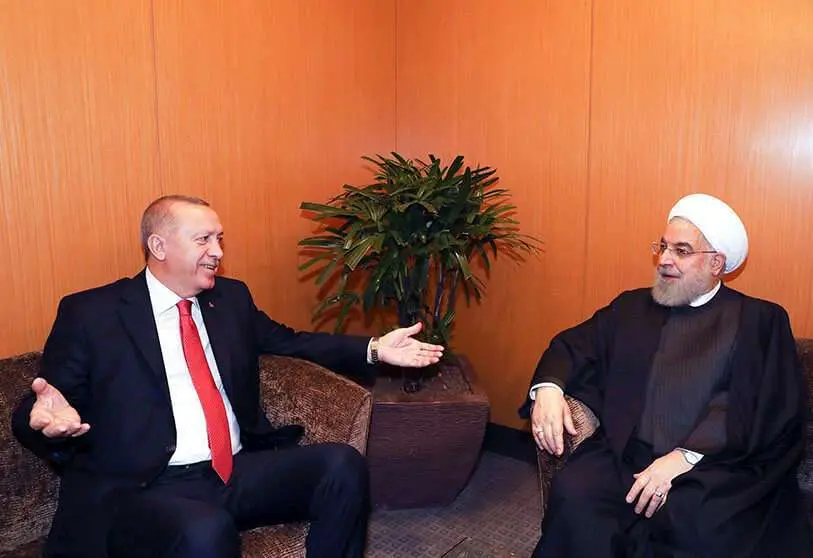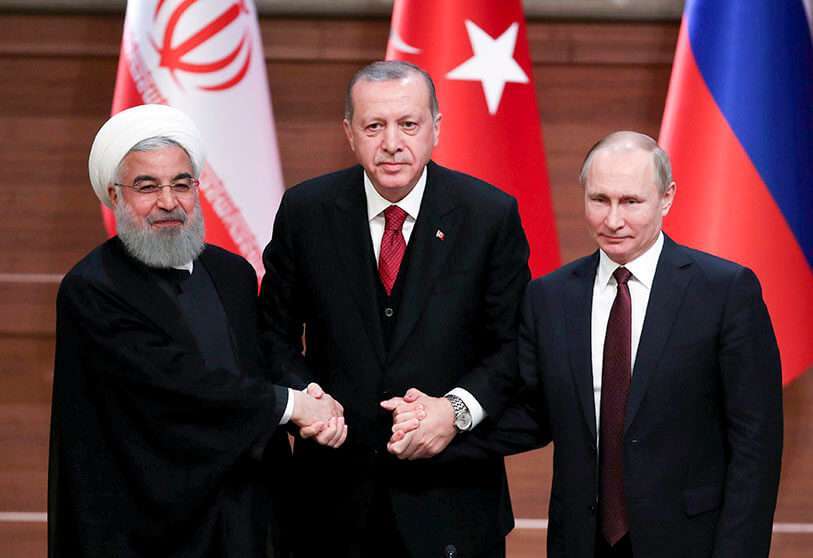Iran and Turkey: a relationship of necessity

Under the leadership of Recep Tayyip Erdogan and his Islamist Party AKP, Turkey has discarded both secularism and the West.
A sign for this is the rapprochement to the Islamic Republic of Iran. Although both countries are immersed in regional conflicts and support different sides: see Syria or Libya, both Erdogan and his Iranian counterpart Hassan Rohani are aware of the necessity of alliances in order to face possible sanctions.
In a message this Thursday, President Rohaní congratulated Erdogan on the National Day of the Republic of Turkey, which was his 97th birthday.
Rohaní stressed the importance of bilateral relations between the two neighbouring countries in the current international situation and the spread of the coronavirus. "Cooperation in health and trade is a top priority," said the Iranian President.
"Taking into account the cultural and historical ties between the two Iranian and Turkish nations, I hope that the friendly and fraternal relations between the two countries will be further strengthened in the current era and that the existing capacities for cooperation in various political, economic, scientific and health fields will be identified and addressed by the two countries," he added.
Ankara and Tehran have been long-standing trade partners. Millions of tourists travel to and from each country every year and bilateral trade flows between the two countries.
The Iranian revolution in 1979 caused a distancing between Iran and Turkey, and their relations became tense for some decades. The Republic of the Ayatollahs disagreed with Turkey's collusion with the state of Israel, particularly over Ankara's work with NATO partners on a missile shield, which Tehran saw as a plot to protect Tel Aviv from an Iranian counterattack if the Jewish state attacked Iran's nuclear facilities.
More recently, Turkey has supported the Syrian opposition, mostly Sunni, rather than the Syrian president, Bachar al-Asad, who is supported by Iran.

However, the ties between the two countries have become closer since Turkey joined Iran in 2017 to side with Qatar in its dispute with Saudi Arabia and the United Arab Emirates.
Ankara has publicly opposed the US sanctions towards Teheran, which in turn has condemned the US financial sanctions against Turkey in 2018.
A week ago, Recep Tayyip Erdogan and Hassan Rohani discussed by phone the possibilities of cooperation in the fight against terrorism, the Turkish presidential office reported. During the conversation Erdogan told Rohani that it is necessary to act together against terrorist organisations, which threaten the unity and integrity of Syria, the Presidency said in a written statement.
The statement said that collaboration between the two countries would also help maintain the ceasefire in the Syrian city of Idlib and ensure stability there.
The two leaders also discussed bilateral issues aimed at strengthening relations between Turkey and Iran, and other regional issues, including the conflict between Azerbaijan and Armenia, the statement added.
Erdogan stressed that Armenia, through its occupation of Azerbaijani territory and attacks, initiated the conflict and stated that Yerevan committed war crimes by attacking civilians. Furthermore, he stressed that it is important to differentiate between the legitimate and the unjust, as well as between the occupational and the occupied forces.
The Turkish leader said that having close cooperation and solidarity with Iran was not only based on the idea of common interests, but on a need for neighbourly relations.
The phone calls came just as Azerbaijani President Ilham Aliyev announced on 26 October that the entire territory on the Azerbaijan-Iran border, which had been under Yerevan's control for nearly 30 years, had been saved. Aliyev celebrated the victory of the people of Azerbaijan and Iran.
Nagorno-Karabakh has witnessed intense fighting in recent weeks that has claimed the lives of 600 people, including civilians. The region is considered by the United Nations and international law to be part of Azerbaijan.








